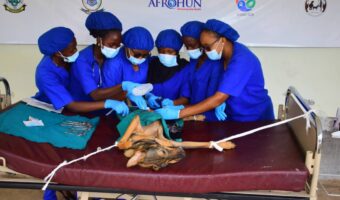
About Us
Tanzania Humane Charity (TAHUCHA)
Organization Overview
TAHUCHA is a professionally managed NGO committed to enhancing animal welfare, Animal health environmental stabilization, and sustainable development. The organization focuses on addressing animal welfare issues, supporting scientific research, and promoting One Health approaches.
History of TAHUCHA
TAHUCHA was founded by Sr. Johnmary and Richard in response to witnessing the severe mistreatment of donkeys, including overloading and painful yokes causing injuries. Motivated by these observations, they created an activist group and invited others with relevant skills to join their cause. Since its establishment, TAHUCHA has been committed to advocating for animal welfare as part of a broader mission to improve human well-being. They address issues of animal abuse, overwork, and injury, particularly in cases where animals are made to carry excessively heavy loads. Operating nationwide but focusing on local impact, TAHUCHA aims to create meaningful and legitimate change. Initially centered on animal welfare, their efforts have expanded to include health, One Health research, wild animals, and humanitarian aid. TAHUCHA believes that a sustainable planet requires the well-being of all its inhabitants. By caring for animals and integrating them into community welfare, they support broader goals such as zero hunger, zero poverty, gender empowerment, and access to education.
Vision
- To create a stable, just, and civilized society that prioritizes and benefits from improved animal welfare.
Mission
- To advance animal welfare, enhance socio-economic development, and improve living standards through education, advocacy, and capacity building.
Core Values
The core values of our organization are typically reflecting its fundamental beliefs and guide its actions. Our organization is focused on animal welfare and health , scientific research, and sustainable development, the following core values would be preferable:
- -Compassion: Demonstrating genuine concern and empathy for the well-being of animals and communities.
- -Integrity: Upholding honesty, transparency, and ethical practices in all activities and interactions.
- -Innovation: Embracing creativity and forward-thinking approaches to solve problems and advance the mission.
- -Collaboration: Working together with stakeholders, partners, and communities to achieve common goals.
- -Accountability: Taking responsibility for actions and outcomes, ensuring that resources are used effectively and responsibly.
- -Sustainability: Committing to practices that ensure long-term environmental, social, and economic health.
- -Respect: Valuing the dignity and rights of all individuals and animals, and fostering an inclusive environment.
- -Excellence: Striving for high standards in research, care, and operational practices.
These core values help to build trust, guide decision-making, and align the organization’s activities with its mission and vision.
Animal Welfare and health Focus:
- -Advocate for climate change and wildlife conservation.
- -Improve shelters and sanctuaries for animals.
- -Support animal clinics and humane education.
- -Facilitate One Health-based research and raise awareness on preventive medicine.
- -Promote preventive health measures for zoonotic diseases, including rabies and toxoplasmosis.
Target Population
-Children and youth
Women
-Community-based organizations (CBOs)
-Community health workers
-Refugees and special groups
-Environmental management stakeholders
-Policy makers
-Traditional and religious groups
-Educational and training institutions
-Wildlife and pastoralist communities
Major Thematic Areas
-Community engagement awareness on animal welfare and health and environmental conservationall efforts calculated to protection of the welfare and health environments , all classes of animals and human.
-Advocacy and scientific research
-Capacity building and intervention
-Institutional development
How We Operate
-Cooperative/Collaborative Activities
-Capacity Building: For grassroots associations and NGOs
-Community Mobilization: Involvement in project planning and implementation
-Participatory Methods: In training, research, and evaluations
-Information Dissemination: Via newsletters and electronic means
-Networking and Advocacy
-Consultancies
Source of Funds
-Member contributions
-Bank interest and soft development loans
-Grants from donors
-Donations
-Community contributions (in-kind)
-Fees for services
Strategic Focus
Goal: Contribute to Tanzania’s middle-income status by 2030.
- 1. Animal Welfare: Ensure animals contribute to community livelihood and health.
- 2. Livelihood Improvement: Enhance food security, financial services, and WASH.
- 3. Good Governance: Strengthen transparency and civic engagement.
- 4. Climate Change and Food Security: Address environmental and food security issues.
- 5. Scientific Research: Support research for informed decision-making and effective interventions.
Where We Work
-Zanzibar-Coastal Zone
-Geita-Northern Western Tanzania
HIGHLIGHTS
Animal Welfare and Animal Health
(TAHUCHA) prioritizes improving animal welfare and health through enhanced veterinary care, better shelters, and humane education. Addressing animal health needs directly benefits community well-being and supports agricultural productivity.
One Health Approach
TAHUCHA adopts the One Health concept, integrating animal health, human health, and environmental considerations. This approach aims to prevent zoonotic diseases, such as rabies and toxoplasmosis, and promotes overall community health.
Scientific Research-Based Work:
TAHUCHA is committed to scientific research in animal health and welfare. The organization conducts research to inform best practices and raise awareness about preventive medicine, including rabies and toxoplasmosis prevention.
Regenerative Agriculture
To sustain its projects, TAHUCHA implements regenerative agricultural practices that improve soil health and ecosystem resilience. This not only supports environmental sustainability but also generates funds to support charitable activities, creating a self-sustaining model for the organization.
PLEASE DONATE

